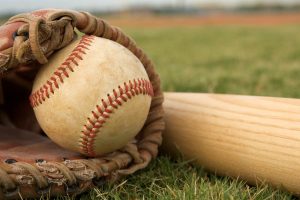Legal Blog
Covering All Bases: Intellectual Property Insights from the Expanding World of Baseball as the Season Begins

The crack of the bat, the countdown of the pitch timer (still getting used to that one), the seventh inning stretch — spring training is over, and the baseball season is now in full swing. Baseball, with its rich history, touches upon a variety of intellectual property issues and features some of the oldest trademarks in use today. Interestingly, a couple of these issues have been in the news recently.
International Play
Like many other sports, baseball is making efforts to broaden its audience beyond the United States. Over the past thirty years, both exhibition and regular-season games have been hosted outside of the U.S. This year, the regular season will kick off with games between the Dodgers and the Padres in Seoul. Additionally, we have witnessed the Red Sox and the Rays competing in spring training games in the Dominican Republic, while the Astros and the Rockies face off to play in Mexico City in April, and the Mets and the Phillies will play in London in June.
So, what do these games have to do with trademarks? Trademarks are protected on a country-by-country basis. Having a trademark in one country does not mean it is protected in another (there is such a thing as an International Registration, but it does not mean what it sounds like it means). That means that Major League Baseball has had to seek protection for its marks in countries around the world.
For example, Major League Baseball (MLB) and/or the team itself owns trademark registrations for iconic brands such as “YANKEES” and their associated logos in countries including Brazil, Australia, Malaysia, the United Kingdom, Costa Rica, Mexico, France, Germany, and Japan. It’s worth noting that in many of these countries, the trademark registrations primarily cover the merchandise accompanying the game, like clothing, jewelry, and sports equipment, rather than the actual playing of baseball games, which is considered an “entertainment service” by trademark offices).
This approach isn’t exclusive to the Yankees; various other teams, such as the Dodgers, Red Sox, Mariners, Rockies, and Diamondbacks, also maintain international trademark portfolios. Surprisingly, there are even trademark registrations for former teams like the defunct Expos in various locations worldwide.
The takeaway here is that whether a business is contemplating expanding its operations beyond the United States or simply manufacturing goods overseas, it is important to take steps to secure trademark protection in the relevant countries of interest proactively.
New Uniforms
The 2024 season brings with it new uniforms that have brought some controversy with them. Designed to be lighter and more flexible, these uniforms have encountered criticism due to certain aspects. The problem is that the new pants appear to be quite sheer, reminiscent of a similar issue faced by Lululemon in 2013. However, some have pointed out that the fabric has not changed and attribute the appearance to lighting conditions. Moreover, there’s dissatisfaction that the uniforms are no longer tailored to the individual players. Social media users have pointed out that two players on the same team wore jerseys with different sleeve cuffs. Additionally, players have complained regarding the appearance of the arm patches, likening them to iron-on patches.
The new uniforms, designed by Nike and approved by MLB, have been manufactured by Fanatics under a longstanding arrangement dating back to 2018. That agreement presumably includes a trademark license, permitting the use of the various MLB and team trademarks on the uniforms. Crucially, any trademark license is required to have a provision giving the licensor (MLB) the right to control the quality of the products sold bearing the licensed trademark. This provision is essential because the purpose of a trademark is to communicate to consumers what they can expect from goods or services using the trademark. Failure to exercise quality control can result in the licensor losing their trademark rights, a situation commonly known as “naked licensing.” If MLB is inclined to address any of the issues raised about the new uniforms, it can leverage the quality control provisions in its agreements with Nike and Fanatics.
Conclusion
Whether you’re cheering from the stands, enjoying the game from the comfort of your living room, or tuning in on the radio, intellectual property issues might not be at the forefront of your mind when you’re watching baseball this season. However, it’s essential to recognize that intellectual property issues hold significant importance for all businesses, regardless of size.
If your business requires assistance protecting its trademarks worldwide or around the diamond, or if you seek to ensure that your license agreements give it the ability to control the quality standards for using its trademarks, please reach out to me. I’m here to support your intellectual property needs and help safeguard your business interests.
ABOUT MARC MISTHAL
 |
|
Marc P. Misthal is a principal attorney in the firm’s Intellectual Property practice group. With a wide range of clients worldwide, Marc provides counsel to businesses spanning diverse industries, including the fashion, apparel, computer technology, hospitality, restaurant, entertainment, jewelry, luxury goods, home goods, furniture, cosmetics, retail and consumer goods industries.
As part of his practice, Marc has represented clients in federal courts around the country, defending and prosecuting claims of trademark, trade dress, and copyright infringement and, when necessary, obtaining injunctive relief. He has also represented clients in Opposition and Cancellation proceedings before the U.S. Patent and Trademark Office (USPTO) and in proceedings under the Uniform Domain Name Dispute Resolution Policy (UDRP).
